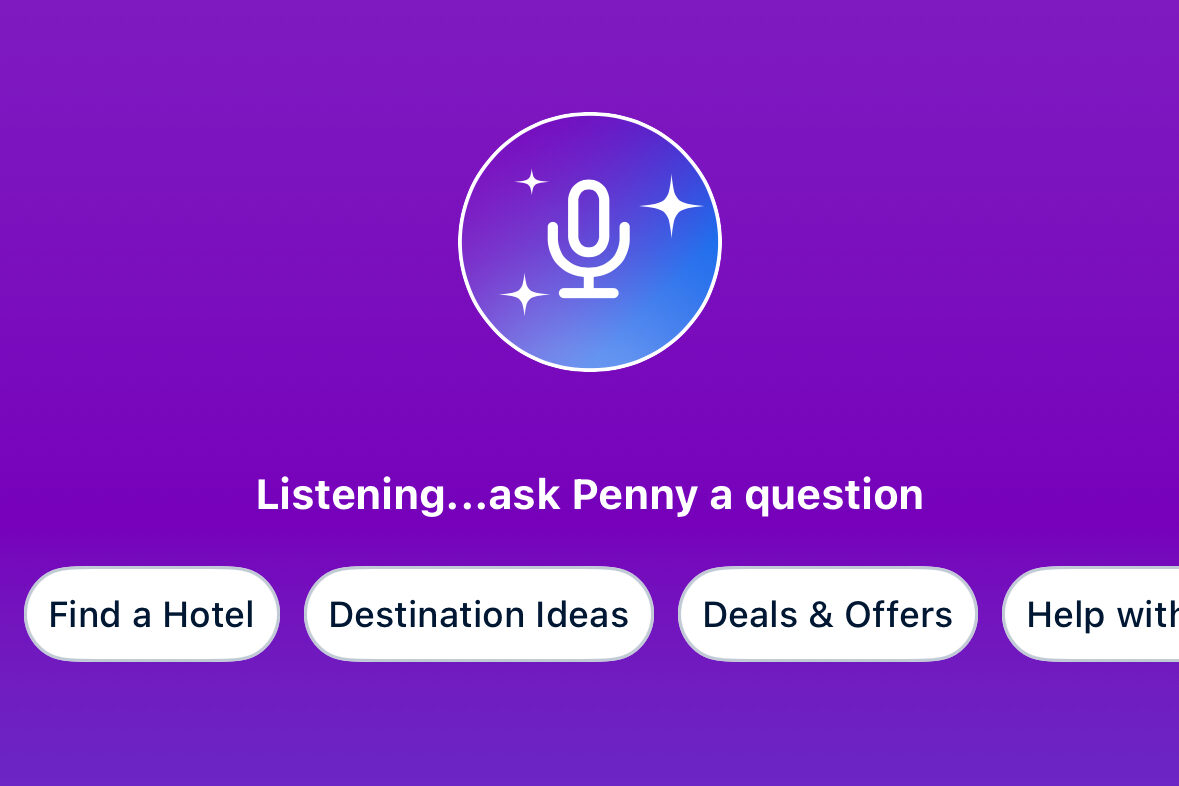
Skift Take
Priceline is among a handful of companies testing OpenAI’s new voice tech. Priceline envisions that its future voicebot will be able to accompany a traveler through an entire trip.
Justin Dawes
Priceline is the first travel company to say that it’s integrating its AI chatbot with the latest voice tech from OpenAI.
That means users can now interact with Penny by speaking or typing to search for hotels (but not flights or rental cars yet.)
The first version of Penny Voice went live on Tuesday, and more updates are rolling out in the coming weeks and months, the company said.
“With Penny Voice, booking travel will soon be as simple as having a conversation,” Priceline said in a statement. The tool is available on the Priceline website and in its iOS app.
The company first released Penny, powered by generative AI from OpenAI, in June 2023.
Travel executives have been talking about voice search for years, but it hasn’t taken off. Even the recent venture from Viator to make bookings through Amazon Alexa was met with skepticism.
The main reason is because the tech hasn’t been nearly advanced enough to make voice search useful. But advancements in AI — particularly this voice update by OpenAI — could be a real start to actually getting there, if voice search is really what travelers want at all.
Like the recent voice updates by Meta, the end-goal is for more than just travel search. The long-term vision is for an AI travel agent that can accompany travelers through an entire trip. Whether users interact with that agent via text or voice or a combination remains to be seen.
The Voice Tech from OpenAI
OpenAI has been rolling out Advanced Voice Mode on ChatGPT over the last week. It’s the same voice tech that will power Penny Voice.
OpenAI got a lot of attention when it shared a demo of the voice upgrade in May, particularly because of the translation capabilities. The upgrade is meant to make speaking with the voicebot as smooth as having a conversation with a person. The voice also pauses when interrupted and can change its tone and better understand different accents.
The previous version of the ChatGPT voicebot sounds human-like but doesn’t operate as quickly or effectively as the latest version. The previous version operates essentially by hearing the voice, turning it into text, translating that text, and then reading the translation aloud — multiple steps that slow it down and can lead to glitches. The new version is voice-to-voice, making the conversation feel more natural.
The upgraded chatbot can also understand non-verbal cues like exhalations and tone of voice, and it can sing.
For now, the voicebot in Advanced Voice mode says it can’t provide real-time information. But it can say “I’m late” in 50 different languages, OpenAI said.
OpenAI said Tuesday that it has raised $6.6 billion in new funding at a $157 billion valuation as it seeks to further advance its tech.
Advanced Voice is rolling out to all Plus and Team users in the ChatGPT app over the course of the week.
While you’ve been patiently waiting, we’ve added Custom Instructions, Memory, five new voices, and improved accents.
It can also say “Sorry I’m late” in over 50 languages. pic.twitter.com/APOqqhXtDg
— OpenAI (@OpenAI) September 24, 2024
Penny Voice
Priceline is among a handful of companies testing OpenAI’s newly announced Realtime API. It’s a connection with OpenAI’s voice tech that’s meant to allow companies to create their own customized AI voice agents.
Other companies testing the tech include language learning app Speak and fitness app Healthify.
Priceline says that Penny will be able to understand “complex consumer queries and anticipate needs based on preferences and past interactions, then respond in a real-time voice.”
Users can search for hotels — shown below — as well as get travel recommendations. Once the hotel options are presented, the user taps on the selection to view and book as normal. Priceline says users can also use the tool to change existing reservations.
Penny Voice will get the full capability of OpenAI’s voice tech in the coming months, Priceline says. That includes the ability for the voicebot to respond to tonality, more accurate speech recognition, and better understanding of diverse accents and speech patterns.
Later, Priceline says Penny Voice will be expanded to the company’s flight, rental car, and vacation package products. And in the future, the company wants to include enhanced customer support and the ability to interact with the voicebot throughout a trip.

